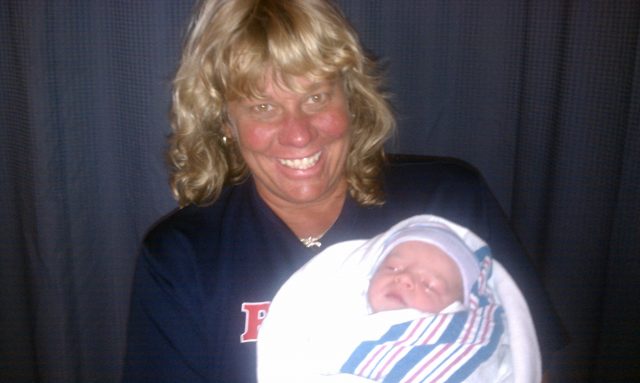Breastfeeding Researcher Shares Expertise with UH Mānoa Nursing and the Community
FOR IMMEDIATE RELEASE
Contact:
Desiree Yamamoto
Community Development Officer UH Mānoa Nursing dlyamamo@hawaii.edu
(808) 741-0617
Breastfeeding Researcher Shares Expertise with UH Mānoa Nursing and the Community
Breast milk is the natural first food for babies, it provides all the energy and nutrients that the infant needs for the first months of life, and it continues to provide up to half or more of a child’s nutritional needs during the second half of the first year. It is a powerful agent that protects against ear infections, gastro-intestinal infections and RSV, a particularly deadly respiratory infection. Exclusive breastfeeding – the infant only receives breast milk without any additional food or drink, not even water – for the first six months of an infant’s life has a long term benefit as it decreases the risk of serious disease such as Type 2 diabetes, childhood leukemia, and risk of obesity.
 “The lack of exclusive breastfeeding in the U.S. is a public health crisis,” said Diane Spatz, PhD, RN-BC, FAAN, UH Mānoa Nursing Frances A. Matsuda Visiting Scholar in Women’s Health. The World Health Organization recommends exclusive breastfeeding for the first six months of life, yet only 20% of infants in Hawaii receive exclusive breast milk during this important time in a child’s life.
“The lack of exclusive breastfeeding in the U.S. is a public health crisis,” said Diane Spatz, PhD, RN-BC, FAAN, UH Mānoa Nursing Frances A. Matsuda Visiting Scholar in Women’s Health. The World Health Organization recommends exclusive breastfeeding for the first six months of life, yet only 20% of infants in Hawaii receive exclusive breast milk during this important time in a child’s life.
Dr. Spatz is a professor of perinatal nursing at the University of Pennsylvania, School of Nursing and the director of the Lactation Program at the Children’s Hospital of Philadelphia. Dr. Spatz is sharing her expertise with the Hawaii community throughout March 2013. She is providing advanced seminars to UH Mānoa Nursing graduate students and conducting workshops on innovative best practices for nurses and physicians at various health care agencies serving Hawaii’s families including Tripler Army Medical Center, Kaiser Permanente Hawaii, Kapiolani Medical Center for Women and Children, Castle Medical Center, and The Queen’s Medical Center. Dr. Spatz is also speaking with the Hawaii Chapter of the American Academy of Pediatrics and the Hawaii Chapter of the National Association of Pediatric Nurse Practitioners.
“Nurses play a critical role in provided evidence based lactation care, support and advice,” said Dr. Spatz. She teaches a course at the University of Pennsylvania, School of Nursing for undergraduate nursing students on breastfeeding and created a support program for Children’s Hospital of Philadelphia employees who are breastfeeding.
“We are pleased to connect Dr. Spatz with the Hawaii community to help promote better health for Hawaii keiki,” said Mary Boland, dean of UH Mānoa Nursing. While Hawaii data indicates that more than 85% of new mothers start breastfeeding, 65% of these mothers either stop breastfeeding early or introduce formula or solid foods before six months. While breastfeeding is a natural activity, it is also a learned behavior for both mother and infant. Most mothers will benefit from support and access to health care providers who can coach them
along the way. Lactation consultants and experienced care providers can make a tremendous difference when a new mother has breastfeeding problems. Sick infants including those in neonatal intensive care units (NICU), are most vulnerable and should only receive breast milk. However, doing so requires hospitals to provide education to nurses and physicians in an effort to help parents and infants.
Dr. Spatz has researched and published intervention studies to improve breastfeeding outcomes especially with low income mothers and vulnerable families. Among the innovative practices she has been involved in is the development of the Spatz (2004) “Ten Step Model for Protection of Human Milk & Breastfeeding in Vulnerable Infants” which has been implemented in many NICU’s in the U.S. and is currently being implemented in all NICU’s throughout Thailand.
While in Hawaii, Dr. Spatz will speak at the Pacific Institute of Nursing Conference on March 21, 2013. Contact UH Mānoa Nursing at www.nursing.hawaii.edu or (808) 956-8522 for more information.
###
UH Mānoa Nursing, the Nursing Capitol of the Pacific, is the leader in nursing education and research in Hawaii with outreach to Asia and the Pacific Basin. We support the mission of the University of Hawaii at Mānoa: to provide an innovative, caring and multicultural environment in which faculty, students and staff work together to generate and transmit knowledge, wisdom, and values to promote quality of life and health for present and future generations. The school offers the BS, master’s, and doctoral programs. To reflect Hawaii’s unique cultural diversity and heritage, UH Mānoa Nursing is committed to increasing Native Hawaiian and other underserved people in all nursing programs. http://www.nursing.hawaii.edu/
